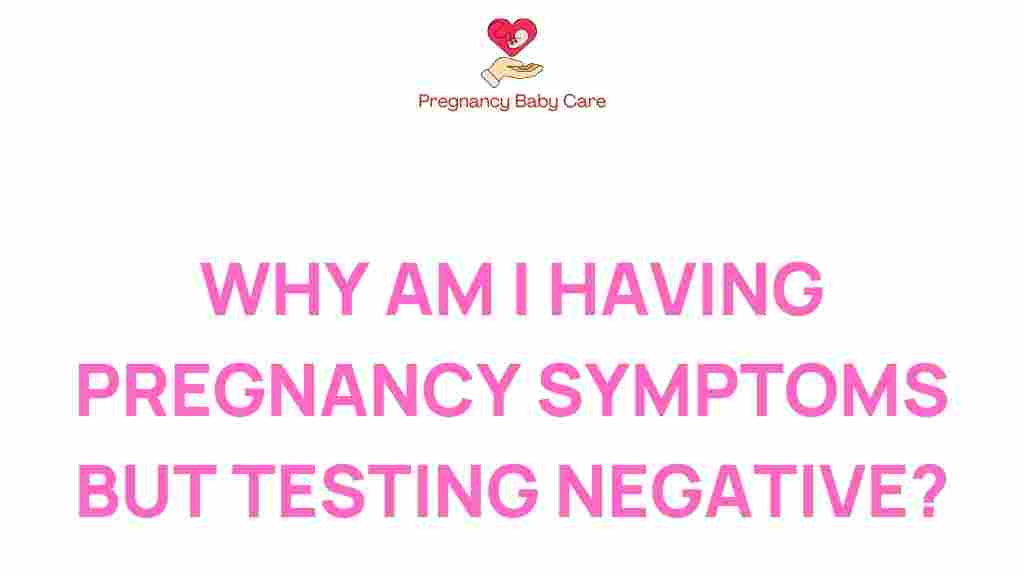The Mystery of Negative Pregnancy Tests: Why Symptoms Persist
Experiencing pregnancy symptoms can be an emotional rollercoaster, especially when home tests yield negative results. The confusion surrounding negative pregnancy tests and persistent symptoms often leaves many women questioning their bodies and their fertility. In this article, we will explore the reasons behind these puzzling situations, focusing on hormonal changes, early signs of pregnancy, and common myths that may contribute to misunderstandings about pregnancy symptoms.
Understanding Pregnancy Symptoms
Pregnancy symptoms can vary widely among women and can begin as early as a week after conception. Common early signs of pregnancy include:
- Missed period
- Nausea or vomiting
- Breast tenderness or swelling
- Fatigue
- Frequent urination
- Food cravings or aversions
These symptoms are primarily due to hormonal changes in the body, especially the increase in hormones like human chorionic gonadotropin (hCG), progesterone, and estrogen. However, when a woman experiences these symptoms but receives a negative test result, it can lead to confusion and concern.
Hormonal Changes and Their Impact
Hormonal fluctuations play a significant role in the development of pregnancy symptoms. After fertilization, the body begins to produce hCG, which is the hormone detected by home pregnancy tests. If the levels of hCG are not high enough to be detected, a negative test result may occur, even if other symptoms are present.
Here are some factors that can influence hormonal changes:
- Timing of the Test: Testing too early can lead to false negatives. It’s usually recommended to wait until after a missed period for the most accurate result.
- Irregular Cycle: Women with irregular menstrual cycles may have difficulty pinpointing ovulation, leading to uncertainty about when to test.
- Pregnancy Complications: Conditions such as ectopic pregnancy can cause symptoms without the expected hCG levels.
Common Reasons for Negative Pregnancy Tests Despite Symptoms
When faced with negative pregnancy tests, it’s essential to consider several possibilities:
- Test Sensitivity: Not all home tests are created equal. Some tests are more sensitive and can detect lower levels of hCG.
- Diluted Urine: Testing after drinking a lot of fluids can dilute urine and lower hCG concentration, leading to a negative result.
- Chemical Pregnancy: This occurs when a fertilized egg does not implant properly, causing pregnancy symptoms but resulting in a negative test.
- Hormonal Imbalances: Conditions like polycystic ovary syndrome (PCOS) can cause symptoms similar to pregnancy without being pregnant.
Step-by-Step Process for Reliable Testing
To increase the chances of an accurate result when using home pregnancy tests, follow these steps:
- Choose the Right Test: Select a highly sensitive pregnancy test that can detect low levels of hCG.
- Follow Instructions: Carefully read and follow the instructions provided with the testing kit.
- Timing is Key: Wait until at least the day of your missed period for the most reliable result.
- Test in the Morning: Morning urine typically contains the highest concentration of hCG.
Troubleshooting Tips for Negative Tests
If you are experiencing pregnancy symptoms but consistently getting negative results, consider the following troubleshooting tips:
- Retest After a Few Days: If you suspect you’re pregnant, wait a few days to retest. hCG levels can rise quickly.
- Consult a Healthcare Provider: If symptoms persist, seek medical advice for further evaluation and possible blood tests.
- Consider Underlying Health Issues: Explore if any health conditions may mimic pregnancy symptoms.
Addressing Fertility Questions
Questions about fertility often arise when dealing with negative pregnancy tests and persistent symptoms. Some common inquiries include:
- Can stress affect pregnancy tests? Yes, high stress levels can impact hormonal balances and menstrual cycles, potentially leading to missed periods and confusion.
- How long should I wait to see a doctor? If you have missed a period and have persistent symptoms for more than a week, it’s advisable to consult a healthcare provider.
- Are there any home remedies that can help? While home remedies may alleviate some symptoms, they will not affect the outcome of a pregnancy test.
Debunking Pregnancy Myths
Myths about pregnancy and testing can lead to unnecessary anxiety. Here are some common misconceptions:
- Myth: You can’t be pregnant if the test is negative. Reality: False negatives can occur; always retest or consult a doctor if symptoms persist.
- Myth: All pregnancy tests are the same. Reality: Different tests have different sensitivities; some may detect pregnancy sooner than others.
- Myth: You should test multiple times a day. Reality: Testing once with first morning urine is usually sufficient.
For more information about pregnancy tests and fertility questions, visit this reliable source.
When to Seek Medical Insights
If you’ve tested negative but still have symptoms, seeking medical insights can provide clarity. Healthcare providers can perform blood tests to measure hCG levels more accurately than home tests. They can also evaluate for other possible causes of your symptoms.
Common medical evaluations may include:
- Blood Tests: To check hCG levels and assess if they are rising as expected.
- Ultrasound: To visualize the uterus and check for signs of pregnancy or other conditions.
- Hormonal Assessments: To evaluate for conditions like PCOS or thyroid issues that may affect menstrual cycles and symptoms.
Conclusion
The mystery of negative pregnancy tests combined with persistent pregnancy symptoms can be perplexing and frustrating. Understanding the role of hormonal changes, the timing of tests, and potential underlying health issues is crucial. If you find yourself in this situation, remember to give your body time, retest as necessary, and consult a healthcare provider for personalized insights and answers to your fertility questions.
By debunking myths surrounding pregnancy and testing, you can approach the situation with a clearer perspective and take informed steps toward understanding your body. Whether you’re hoping for a positive result or seeking answers, knowledge is your best ally in navigating this complex journey.
This article is in the category Pregnancy and created by PregnancyBabyCare Team
